WASHINGTON, D.C. -- A majority of Americans likely support President Barack Obama's executive order Monday doing away with the rules on federal funding of embryonic stem cell research that were in place under the Bush administration. In a ���۴�ýPoll conducted last month, 38% of Americans said they support easing those restrictions and another 14% said they favor no restrictions at all. About 4 in 10 Americans favor keeping the Bush restrictions or eliminating federal funding altogether.
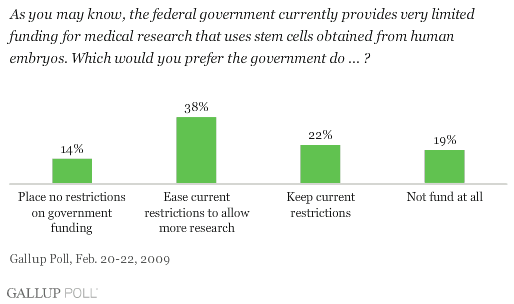
President Obama's executive order overturns George W. Bush's 2001 decision to restrict government funding to stem cell lines created before Aug. 9, 2001. Bush's order left scientists to rely on private donations to work with the hundreds of lines created since then. Obama's order doesn't specify which lines can now be used, and instead gives the National Institutes of Health 120 days to develop new rules.
Because stem cells harvested from embryos can morph into other types of cells in the body, scientists want to use them for research that might help them better treat, and possibly cure, serious conditions from diabetes to paralysis. Opponents of embryonic stem cell research say any medical advances are not worth what they see as the destruction of human life.
Americans' views on government funding for stem cell research have remained fairly stable since 2004, with the majority consistently supporting fewer restrictions on funding, rather than maintaining or strengthening the current restrictions.
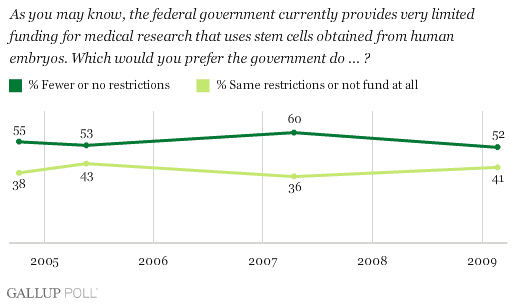
Views on government funding of embryonic stem cell research are, of course, highly political. While a strong majority of Democrats support fewer or no restrictions (64%), a majority of Republicans support keeping the Bush administration restrictions or not funding the research at all (57%). Notably, relatively few Americans of any political background favor the more extreme positions: no restrictions on government funding or not funding stem cell research at all.
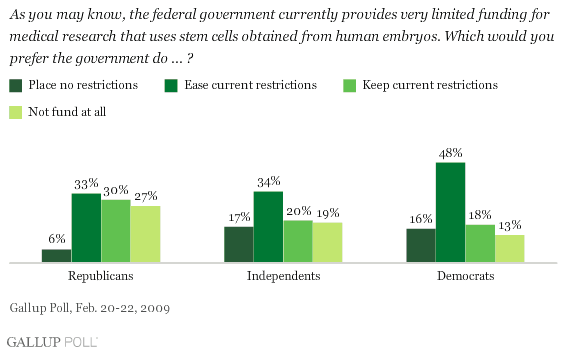
Self-identified conservatives are the most likely to say the government should not fund embryonic stem cell research at all (32%) while self-identified liberals are the most likely to favor no restrictions whatsoever (28%).
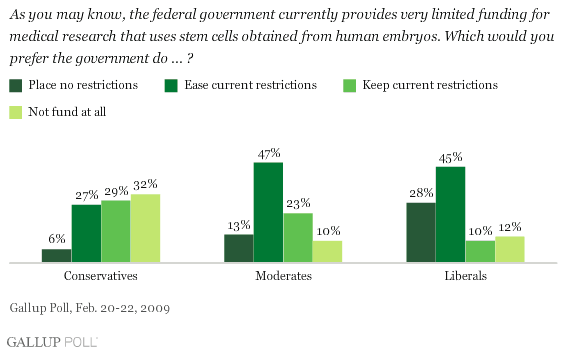
Americans' inclination to support some sort of government funding for embryonic stem cell research is underscored by findings from Gallup's May 2008 update on values and beliefs, which found 6 in 10 Americans (62%) saying medical research using stem cells obtained from human embryos is morally acceptable while 30% said it is morally wrong.
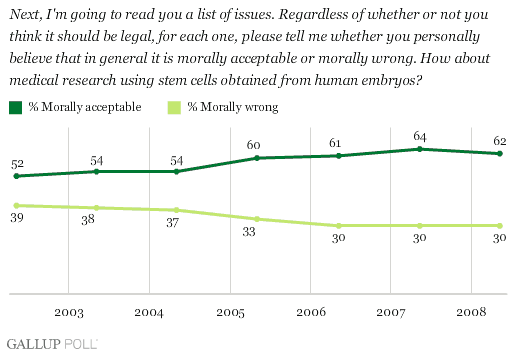
Overall, a majority of Americans are likely to support Obama's decision to overturn existing restrictions on federal funding for embryonic stem cell research, including many Democrats and liberals in particular. While Republicans and conservatives lean more toward keeping the Bush administration's restrictions or eliminating federal funding altogether, it is important to note that most Americans -- regardless of political or ideological orientation -- want some sort of restrictions in place. Thus, lawmakers and those entrusted with overseeing the new policy should proceed with caution as they ponder actions that could take Obama's decision Monday even further -- be it by passing legislation in Congress to make the move irreversible or by overturning the existing ban on experiments on such embryos.
Survey Methods
Results are based on telephone interviews with 1,013 national adults, aged 18 and older, conducted Feb. 20-22, 2009. For results based on the total sample of national adults, one can say with 95% confidence that the maximum margin of sampling error is ±3 percentage points.
Interviews are conducted with respondents on land-line telephones (for respondents with a land-line telephone) and cellular phones (for respondents who are cell-phone only).
In addition to sampling error, question wording and practical difficulties in conducting surveys can introduce error or bias into the findings of public opinion polls.
